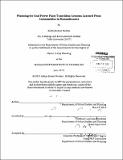| dc.contributor.advisor | Lawrence Susskind. | en_US |
| dc.contributor.author | Nochur, Aditya Kumar | en_US |
| dc.contributor.other | Massachusetts Institute of Technology. Department of Urban Studies and Planning. | en_US |
| dc.coverage.spatial | n-us-ma | en_US |
| dc.date.accessioned | 2013-10-24T17:39:04Z | |
| dc.date.available | 2013-10-24T17:39:04Z | |
| dc.date.copyright | 2013 | en_US |
| dc.date.issued | 2013 | en_US |
| dc.identifier.uri | http://hdl.handle.net/1721.1/81647 | |
| dc.description | Thesis (M.C.P.)--Massachusetts Institute of Technology, Dept. of Urban Studies and Planning, 2013. | en_US |
| dc.description | Cataloged from PDF version of thesis. | en_US |
| dc.description | Includes bibliographical references (p. 86-93). | en_US |
| dc.description.abstract | As coal-fired power plants across the U.S. are retiring in increasing numbers - a trend likely to continue in the years ahead - the communities that host these plants will play a critical role in balancing local concerns about public health, tax revenue, jobs and economic development with broader issues of fossil fuel dependence and climate change. This thesis investigates how three municipalities in Massachusetts are planning around the potential reuse and redevelopment of their coal plant sites. How are different stakeholder interests being convened and working together in these communities? What kinds of processes for public engagement are in place? Are these stakeholder and public engagement processes leading to politically viable outcomes? This thesis finds that active engagement of government officials, diverse and inclusive stakeholder tables, clear opportunities for public engagement and provision of adequate resources are all critical to credible, effective and sustained community processes around coal transition planning. Coal communities in Massachusetts vary in the extent to which they meet these criteria, but none of them are currently maximizing the potential for collaborative problem-solving around coal plant reuse. I conclude that consensus building presents a promising approach by which these municipalities might develop collective visions for coal plant reuse and create clear and actionable pathways towards sustainable redevelopment. | en_US |
| dc.description.statementofresponsibility | by Aditya Kumar Nochur. | en_US |
| dc.format.extent | 93 p. | en_US |
| dc.language.iso | eng | en_US |
| dc.publisher | Massachusetts Institute of Technology | en_US |
| dc.rights | M.I.T. theses are protected by
copyright. They may be viewed from this source for any purpose, but
reproduction or distribution in any format is prohibited without written
permission. See provided URL for inquiries about permission. | en_US |
| dc.rights.uri | http://dspace.mit.edu/handle/1721.1/7582 | en_US |
| dc.subject | Urban Studies and Planning. | en_US |
| dc.title | Planning for coal power plant transition : lessons learned from communities in Massachusetts | en_US |
| dc.type | Thesis | en_US |
| dc.description.degree | M.C.P. | en_US |
| dc.contributor.department | Massachusetts Institute of Technology. Department of Urban Studies and Planning | |
| dc.identifier.oclc | 859599153 | en_US |
